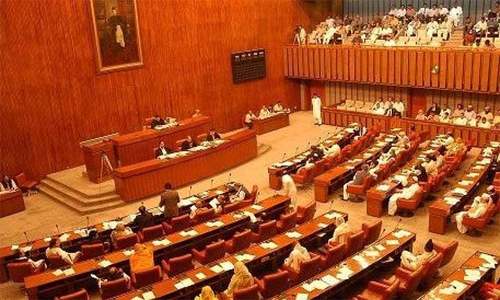'No more NROs': PM Imran lashes out at opposition for defeating two FATF-related bills in Senate

Prime Minister Imran Khan on Tuesday lambasted the opposition for defeating two bills related to the Financial Action Task Force (FATF) in the Senate, accusing his political rivals of seeking to sabotage efforts for Pakistan's exit from the watchdog's 'grey list' for their personal interests.
The premier conveyed his criticism through a series of tweets hours after the opposition-dominated Senate rejected the Anti-Money Laundering (Second Amendment) Bill and the Islamabad Capital Territory (ICT) Waqf Properties Bill, both of which were passed by the National Assembly just a day earlier.
Palpably unhappy at the non-approval of what he termed as "critical" FATF-related legislation, Prime Minister Imran said he had maintained from the beginning that "the self-serving interests of the opposition leaders and the country's interests are divergent."
He said with the tightening of the accountability noose, opposition leaders have "become desperate to save their corrupt money by trying to prevent parliament from functioning".
The prime minister accused the opposition of first seeking to undermine the government's "effective Covid-19 strategy", which he called "a recognised global success story" and of now "trying to sabotage Pakistan's efforts to exit FATF grey list".
"Opposition tries to hide behind [the] facade of democracy to protect their loot & plunder," he said, adding that the opposition "would even have Pakistan put on FATF's black list" in order to blackmail the government for a National Reconciliation Ordinance (NRO)-like concession by "defanging" the National Accountability Bureau.
He said the opposition members "keep threatening to bring down [the] government unless given NRO".
"Let me make clear: No matter what happens, my government will not allow any NRO as it would be [a] betrayal of nation's trust in holding plunderers of public wealth accountable," the premier proclaimed.
He said former military ruler retired Gen Pervez Musharraf had given NROs to the leaders of two political parties, a reference to the PML-N and PPP, which he said "quadrupled our debt & destroyed economy".
"There will be no more NROs," Prime Minister Imran concluded.
On Monday, the government through a well-planned strategy and with covert support of opposition parties had managed to get the two FATF-related bills — Anti-Money Laundering and ICT Waqf Properties — passed from the National Assembly after a heated debate on the role of NAB.
The anti-money laundering bill gives more powers to investigating agencies in the fight against money laundering and terror financing and suggests increase in sentences and fines.
In their speeches, opposition members in the NA had mostly raised objections over the inclusion of NAB in the investigation agencies mentioned in the anti-money laundering bill.
PML-N’s Khawaja Asif had also protested recent allegations by some ministers that the opposition was trying to seek a deal with the government as a bargain for its support to the bills which were required to be passed by the parliament to fulfil conditions of the FATF.
Raja Pervez Ashraf of the PPP had expressed his concern over making money laundering a cognisable offence and regarding giving powers to investigation agencies to arrest an accused person without a warrant.
But Law Minister Farogh Naseem had defended the bill and rejected the opposition’s objections regarding NAB’s role, saying it was not the PTI government which had given this role to the anti-graft watchdog. Moreover, he said that money laundering was already a scheduled offence under NAB laws.
The ICT Waqf Properties Bill is aimed at improving and streamlining the “management, supervision and administration of Waqf properties". The bill after its passage from the Senate would put all the Waqf properties, including mosques, Khanqahs, shrines and dargahs, and contributions and donations of all kinds to these places under the control of the government. Members of the Muttahida Majlis-i-Amal (MMA) had opposed the legislation.














































